人教版(2019)必修 第三册Unit 2 Morals and Virtues Discovering Useful Structure 课件(2)(共18张PPT)
文档属性
| 名称 | 人教版(2019)必修 第三册Unit 2 Morals and Virtues Discovering Useful Structure 课件(2)(共18张PPT) | 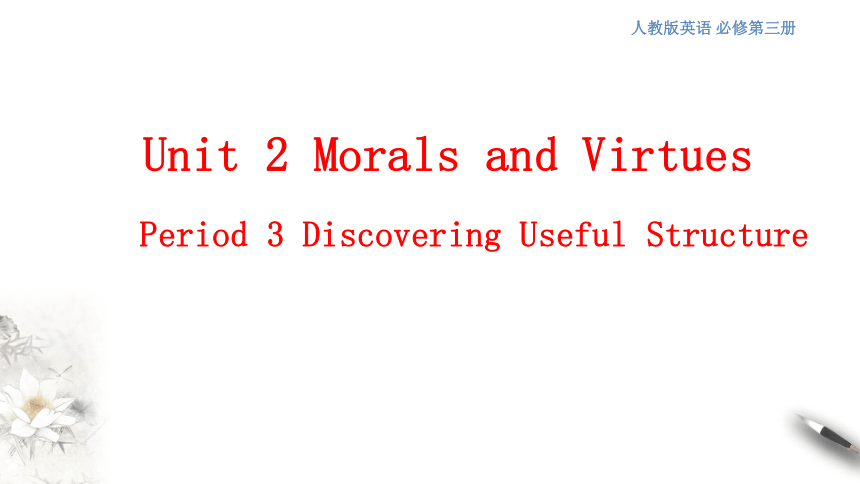 | |
| 格式 | pptx | ||
| 文件大小 | 203.8KB | ||
| 资源类型 | 教案 | ||
| 版本资源 | 人教版(2019) | ||
| 科目 | 英语 | ||
| 更新时间 | 2023-04-17 15:07:34 | ||
图片预览

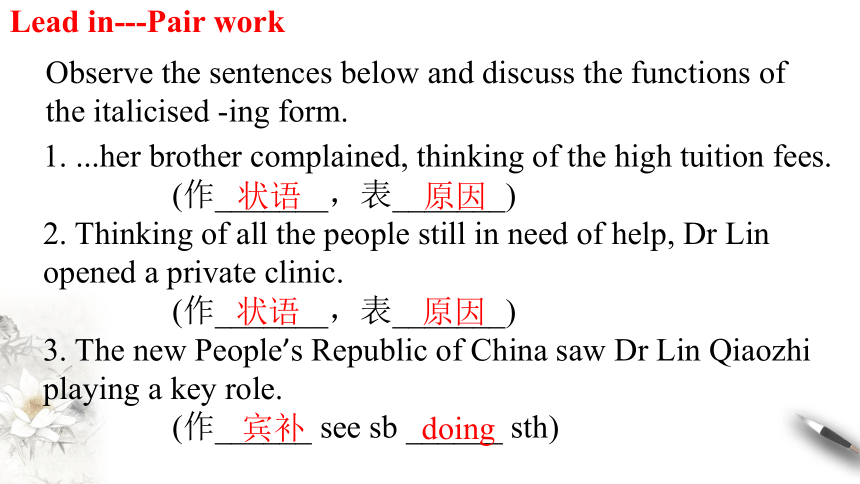
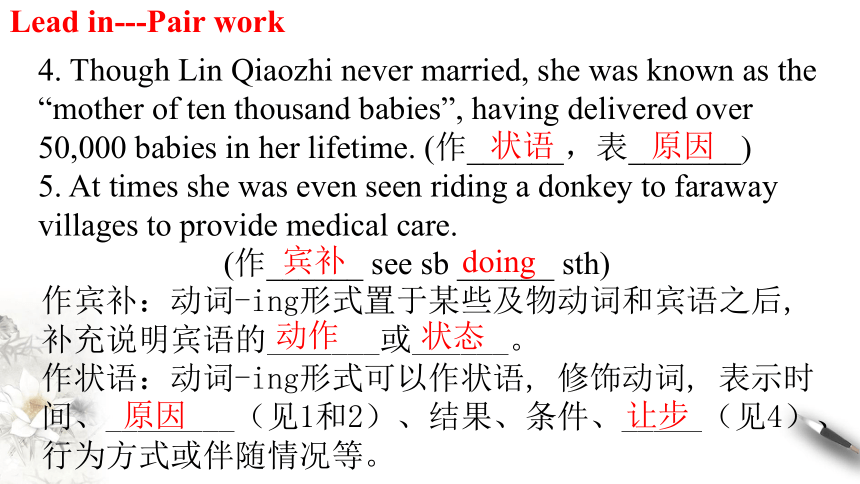
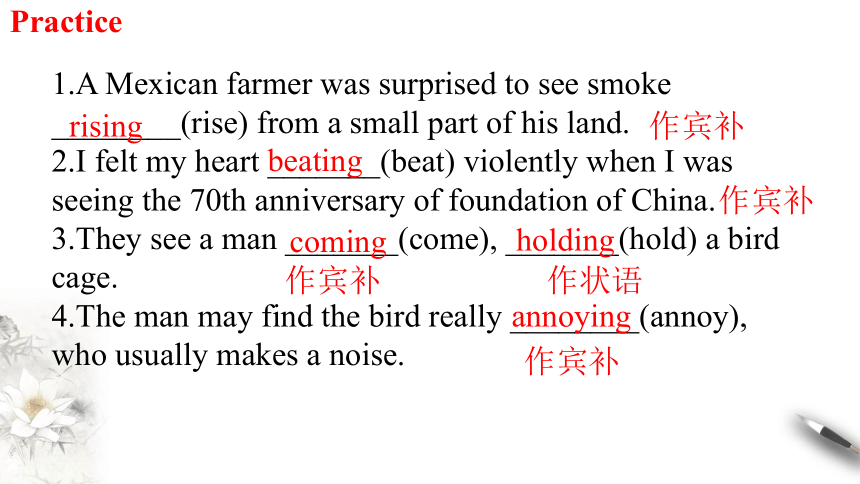
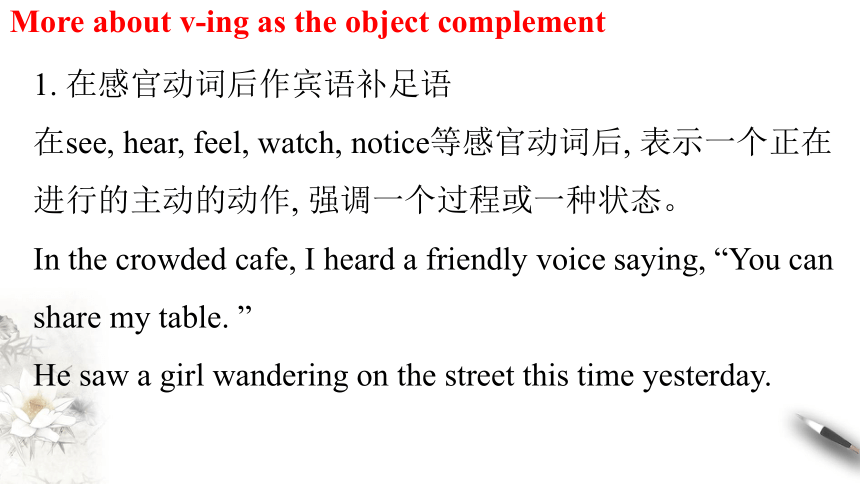

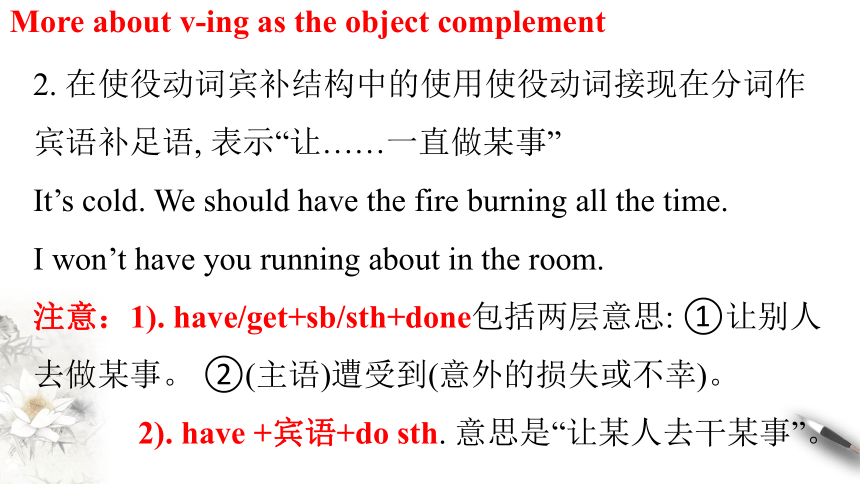
文档简介
(共18张PPT)
人教版英语 必修第三册
Period 3 Discovering Useful Structure
Unit 2 Morals and Virtues
Observe the sentences below and discuss the functions of the italicised -ing form.
Lead in---Pair work
1. ...her brother complained, thinking of the high tuition fees.
(作_______,表_______)
2. Thinking of all the people still in need of help, Dr Lin opened a private clinic.
(作_______,表_______)
3. The new People’s Republic of China saw Dr Lin Qiaozhi playing a key role.
(作______ see sb ______ sth)
状语
原因
状语
原因
宾补
doing
Lead in---Pair work
4. Though Lin Qiaozhi never married, she was known as the “mother of ten thousand babies”, having delivered over 50,000 babies in her lifetime. (作______,表_______)
5. At times she was even seen riding a donkey to faraway villages to provide medical care.
(作______ see sb ______ sth)
状语
原因
宾补
doing
作宾补:动词-ing形式置于某些及物动词和宾语之后, 补充说明宾语的_______或______。
作状语:动词-ing形式可以作状语, 修饰动词, 表示时间、________(见1和2)、结果、条件、_____(见4)、行为方式或伴随情况等。
动作
状态
原因
让步
Practice
1.A Mexican farmer was surprised to see smoke ________(rise) from a small part of his land.
2.I felt my heart _______(beat) violently when I was seeing the 70th anniversary of foundation of China.
3.They see a man _______(come), _______(hold) a bird cage.
4.The man may find the bird really ________(annoy), who usually makes a noise.
rising
作宾补
beating
作宾补
coming
作宾补
holding
作状语
annoying
作宾补
1. 在感官动词后作宾语补足语
在see, hear, feel, watch, notice等感官动词后, 表示一个正在进行的主动的动作, 强调一个过程或一种状态。
In the crowded cafe, I heard a friendly voice saying, “You can share my table. ”
He saw a girl wandering on the street this time yesterday.
More about v-ing as the object complement
注意:see/hear/watch/feel/notice+sb/sth+doing sth
强调动作___________
see/hear/watch/feel/notice+sb/sth+do sth
强调动作发生的正在进行_______/全过程已经结束了
Today on my way home, I saw a man ______(run) along the street hurriedly.
I saw him _______(enter) the room and take something away.
More about v-ing as the object complement
正在进行
全过程
running
enter
2. 在使役动词宾补结构中的使用使役动词接现在分词作宾语补足语, 表示“让……一直做某事”
It’s cold. We should have the fire burning all the time.
I won’t have you running about in the room.
注意:1). have/get+sb/sth+done包括两层意思: ①让别人去做某事。 ②(主语)遭受到(意外的损失或不幸)。
2). have +宾语+do sth. 意思是“让某人去干某事”。
More about v-ing as the object complement
翻译:
1.Mother has me go to the shop to buy some fruit. ______________________________
2.He had/got his computer stolen the other day. ______________________________
3.He will have/get the computer repaired tomorrow. ______________________________
More about v-ing as the object complement
妈妈让我去商店买些水果。
前天,他的电脑被偷了。
他明天会去修电脑。
2). leave/keep +sb/sth done sth(使……处于/保持某种状态)
Many teachers keep parents ________(inform) of children’s performance in the kindergarten by sharing videos on WeChat.
3. 现在分词在with复合结构中的使用
在with复合结构中, 现在分词充当宾语补足语, 表动作的“正在进行”.
Does Kilimanjaro deserve its reputation as a crowded mountain with lines of tourists ruining the atmosphere of peace
More about v-ing as the object complement
informed
注意:在with的复合结构中, 也可以使用不定式和过去分词作宾语补足语。
All the afternoon he worked with the door locked(表____).
I can’t go out with all these clothes to wash(表____).
More about v-ing as the object complement
被动
将来
1. China’s image is improving steadily, with more countries __________(recognize) its role in international affairs.
2. Don’t leave the water _______(run) while you brush your teeth.
3. Mr Smith suggested a good way to have her written English _________(improve) in a short period.
4. Mother has the little girl ____(play) the piano this afternoon.
5. I noticed a thief______(steal) money from the old woman’s pocket yesterday
6. Can you hear her _______(sing) the song in the next room
Practice
recognizing
running
improved
play
steal
singing
-ing形式作时间、原因、条件、让步状语时多位于句首;
作结果、伴随情况状语时常位于句末。
More about v-ing as the adverbial
1. 表示时间。
Hearing these stories, I’m skeptical about the place.
= When __________________ . . .
2. 表示原因。
Not knowing his address, I can’t send this book to him.
= ____________________________________ . . .
I heard these stories,
Because/Since/As I don’t know his address,
More about v-ing as the adverbial
3. 表示结果。
His father died, leaving him a lot of money.
=. . . ____ left him a lot of money
4. 表示条件。
Going straight down the road, you will find the department store.
= ______________________________ . . .
and
If you go straight down the road,
More about v-ing as the adverbial
5. 表示让步。
Being tired, they went on working.
= ____________________ ...
6. 表示行为方式、伴随情况或补充说明。
He lay on the grass, staring at the sky for a long time.
=. . . and ______________________________
Although they were tired,
stared at the sky for a long time.
注意:非谓语动词作状语时, 如所提供的动词不能和句子中的主语保持一致, 动词-ing形式必须有自己的逻辑主语, 通常由名词或代词来担任, 这就是独立主格结构。
The last bus having gone, we had to walk home.
(having gone的逻辑主语是the last bus, 而不是we)
Weather permitting, the football match will be played on Friday.
(permitting的逻辑主语是time, 而不是the football match)
More about v-ing as the abverbial
1. ________(study) hard, you are sure to get first prize.
2. People use plastic in their daily life, _______(leave) large amounts of waste.
3. ________(work) hard at your lessons, you are to succeed.
4. The old man, ____________(work) abroad for twenty years, is on the way back to his motherland.
5. ______________(finish) his homework, he was playing on the playground.
Practice
Studying
leaving
Working
having worked
Having finished
Homework
Finish the pratice items on Book 3 P22.
Thank you!
人教版英语 必修第三册
Period 3 Discovering Useful Structure
Unit 2 Morals and Virtues
Observe the sentences below and discuss the functions of the italicised -ing form.
Lead in---Pair work
1. ...her brother complained, thinking of the high tuition fees.
(作_______,表_______)
2. Thinking of all the people still in need of help, Dr Lin opened a private clinic.
(作_______,表_______)
3. The new People’s Republic of China saw Dr Lin Qiaozhi playing a key role.
(作______ see sb ______ sth)
状语
原因
状语
原因
宾补
doing
Lead in---Pair work
4. Though Lin Qiaozhi never married, she was known as the “mother of ten thousand babies”, having delivered over 50,000 babies in her lifetime. (作______,表_______)
5. At times she was even seen riding a donkey to faraway villages to provide medical care.
(作______ see sb ______ sth)
状语
原因
宾补
doing
作宾补:动词-ing形式置于某些及物动词和宾语之后, 补充说明宾语的_______或______。
作状语:动词-ing形式可以作状语, 修饰动词, 表示时间、________(见1和2)、结果、条件、_____(见4)、行为方式或伴随情况等。
动作
状态
原因
让步
Practice
1.A Mexican farmer was surprised to see smoke ________(rise) from a small part of his land.
2.I felt my heart _______(beat) violently when I was seeing the 70th anniversary of foundation of China.
3.They see a man _______(come), _______(hold) a bird cage.
4.The man may find the bird really ________(annoy), who usually makes a noise.
rising
作宾补
beating
作宾补
coming
作宾补
holding
作状语
annoying
作宾补
1. 在感官动词后作宾语补足语
在see, hear, feel, watch, notice等感官动词后, 表示一个正在进行的主动的动作, 强调一个过程或一种状态。
In the crowded cafe, I heard a friendly voice saying, “You can share my table. ”
He saw a girl wandering on the street this time yesterday.
More about v-ing as the object complement
注意:see/hear/watch/feel/notice+sb/sth+doing sth
强调动作___________
see/hear/watch/feel/notice+sb/sth+do sth
强调动作发生的正在进行_______/全过程已经结束了
Today on my way home, I saw a man ______(run) along the street hurriedly.
I saw him _______(enter) the room and take something away.
More about v-ing as the object complement
正在进行
全过程
running
enter
2. 在使役动词宾补结构中的使用使役动词接现在分词作宾语补足语, 表示“让……一直做某事”
It’s cold. We should have the fire burning all the time.
I won’t have you running about in the room.
注意:1). have/get+sb/sth+done包括两层意思: ①让别人去做某事。 ②(主语)遭受到(意外的损失或不幸)。
2). have +宾语+do sth. 意思是“让某人去干某事”。
More about v-ing as the object complement
翻译:
1.Mother has me go to the shop to buy some fruit. ______________________________
2.He had/got his computer stolen the other day. ______________________________
3.He will have/get the computer repaired tomorrow. ______________________________
More about v-ing as the object complement
妈妈让我去商店买些水果。
前天,他的电脑被偷了。
他明天会去修电脑。
2). leave/keep +sb/sth done sth(使……处于/保持某种状态)
Many teachers keep parents ________(inform) of children’s performance in the kindergarten by sharing videos on WeChat.
3. 现在分词在with复合结构中的使用
在with复合结构中, 现在分词充当宾语补足语, 表动作的“正在进行”.
Does Kilimanjaro deserve its reputation as a crowded mountain with lines of tourists ruining the atmosphere of peace
More about v-ing as the object complement
informed
注意:在with的复合结构中, 也可以使用不定式和过去分词作宾语补足语。
All the afternoon he worked with the door locked(表____).
I can’t go out with all these clothes to wash(表____).
More about v-ing as the object complement
被动
将来
1. China’s image is improving steadily, with more countries __________(recognize) its role in international affairs.
2. Don’t leave the water _______(run) while you brush your teeth.
3. Mr Smith suggested a good way to have her written English _________(improve) in a short period.
4. Mother has the little girl ____(play) the piano this afternoon.
5. I noticed a thief______(steal) money from the old woman’s pocket yesterday
6. Can you hear her _______(sing) the song in the next room
Practice
recognizing
running
improved
play
steal
singing
-ing形式作时间、原因、条件、让步状语时多位于句首;
作结果、伴随情况状语时常位于句末。
More about v-ing as the adverbial
1. 表示时间。
Hearing these stories, I’m skeptical about the place.
= When __________________ . . .
2. 表示原因。
Not knowing his address, I can’t send this book to him.
= ____________________________________ . . .
I heard these stories,
Because/Since/As I don’t know his address,
More about v-ing as the adverbial
3. 表示结果。
His father died, leaving him a lot of money.
=. . . ____ left him a lot of money
4. 表示条件。
Going straight down the road, you will find the department store.
= ______________________________ . . .
and
If you go straight down the road,
More about v-ing as the adverbial
5. 表示让步。
Being tired, they went on working.
= ____________________ ...
6. 表示行为方式、伴随情况或补充说明。
He lay on the grass, staring at the sky for a long time.
=. . . and ______________________________
Although they were tired,
stared at the sky for a long time.
注意:非谓语动词作状语时, 如所提供的动词不能和句子中的主语保持一致, 动词-ing形式必须有自己的逻辑主语, 通常由名词或代词来担任, 这就是独立主格结构。
The last bus having gone, we had to walk home.
(having gone的逻辑主语是the last bus, 而不是we)
Weather permitting, the football match will be played on Friday.
(permitting的逻辑主语是time, 而不是the football match)
More about v-ing as the abverbial
1. ________(study) hard, you are sure to get first prize.
2. People use plastic in their daily life, _______(leave) large amounts of waste.
3. ________(work) hard at your lessons, you are to succeed.
4. The old man, ____________(work) abroad for twenty years, is on the way back to his motherland.
5. ______________(finish) his homework, he was playing on the playground.
Practice
Studying
leaving
Working
having worked
Having finished
Homework
Finish the pratice items on Book 3 P22.
Thank you!
